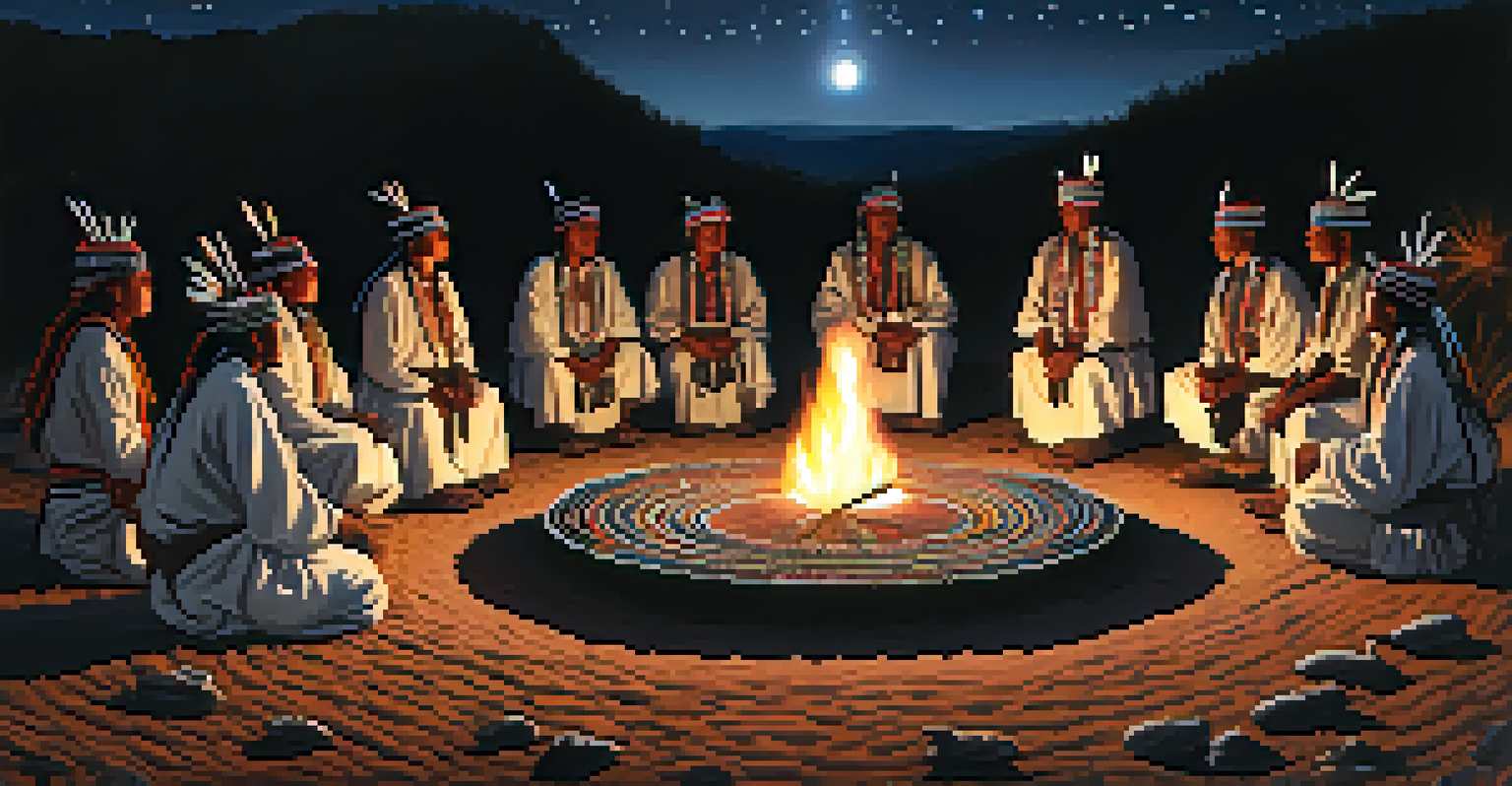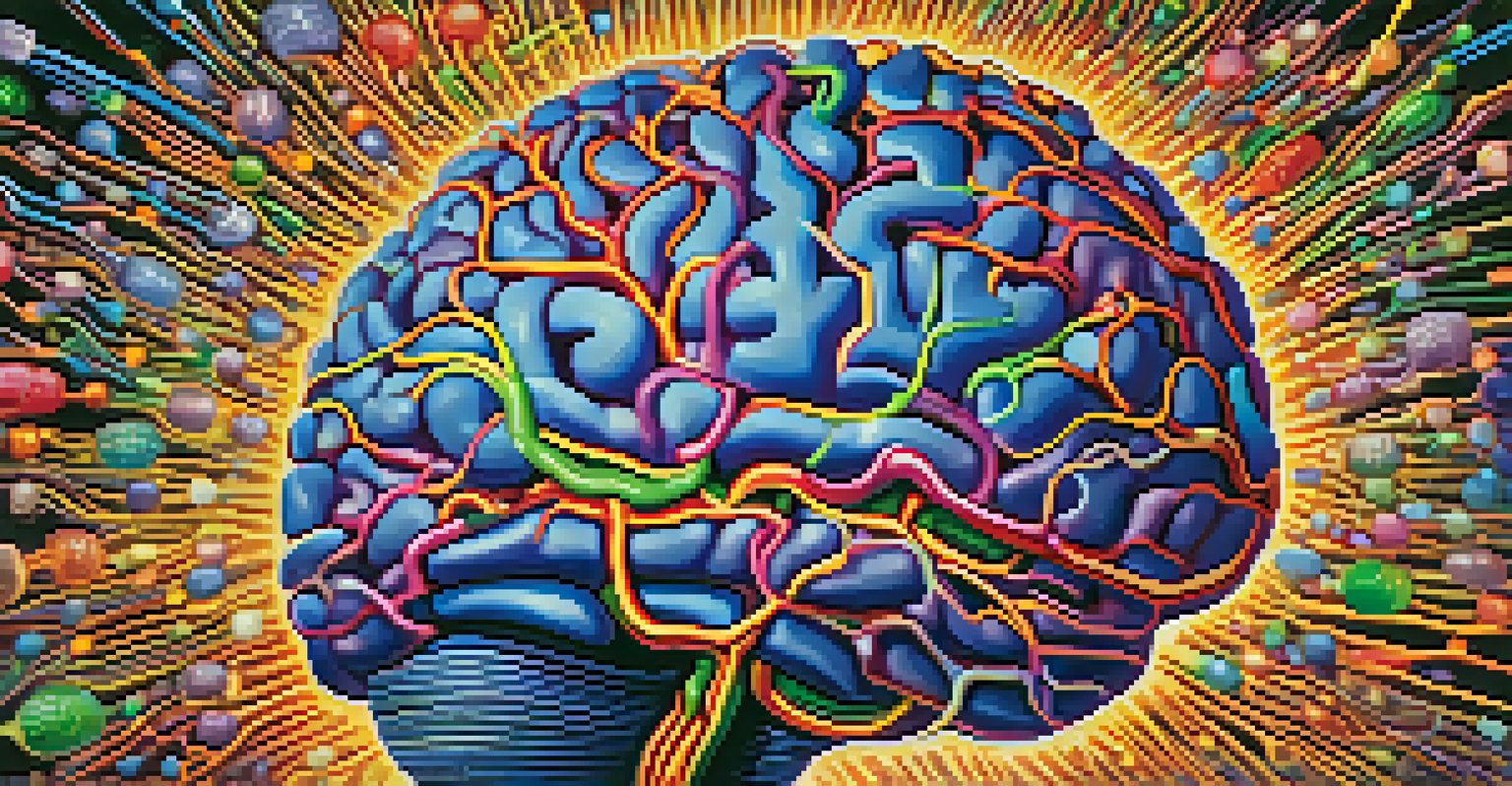Neuroscience of Bliss: How Peyote Affects the Brain

Understanding Peyote: The Plant and Its History
Peyote, a small cactus native to Mexico and the southern United States, has been used for thousands of years in spiritual and healing rituals. This fascinating plant contains mescaline, a psychoactive compound that alters perception and mood. Indigenous cultures have long revered peyote for its ability to facilitate deep introspection and connection to the divine, making it a crucial part of their traditions.
The experience of bliss often reported during peyote sessions may help patients confront difficult emotions or trauma, leading to healing and personal growth.
The history of peyote is rich and complex, intertwining with the cultural practices of Native American tribes. These groups have utilized peyote in religious ceremonies to achieve altered states of consciousness, often seeking enlightenment or answers to life's profound questions. Understanding this historical context helps us appreciate the significance of peyote beyond just its chemical compounds.
As we delve into the neuroscience behind peyote, it's essential to recognize its longstanding role in various cultures. This connection to ancient practices reveals much about the human experience and the pursuit of bliss through natural means.
The Science of Mescaline: How It Works in the Brain
Mescaline, the active ingredient in peyote, primarily affects serotonin receptors in the brain, particularly the 5-HT2A receptor. This interaction leads to changes in mood, perception, and cognition, often resulting in feelings of happiness and connectedness. By mimicking the structure of serotonin, mescaline alters the way our brain processes information, paving the way for unique experiences.

When mescaline binds to these receptors, it triggers a cascade of neurological events that enhance sensory perception and emotional responses. Users often report vivid visual hallucinations, enhanced tactile sensations, and profound emotional insights. This heightened awareness can lead to a deeper understanding of oneself and one’s surroundings, contributing to the overall feeling of bliss.
Peyote's Cultural and Spiritual Roots
Peyote holds deep cultural significance for Indigenous peoples, serving as a vital element in their spiritual and communal practices.
The brain's default mode network (DMN), which is associated with self-referential thoughts and daydreaming, also plays a role in how mescaline affects consciousness. Studies suggest that peyote can dampen the activity in the DMN, leading to a sense of unity and connectedness with the world, further amplifying the blissful experience.
The Role of Neurotransmitters in Blissful States
Neurotransmitters are the brain's chemical messengers, and they play a critical role in mood regulation. Alongside serotonin, other neurotransmitters like dopamine and endorphins contribute to feelings of happiness and pleasure. Understanding how peyote influences these chemicals helps us grasp its potential for inducing blissful states.
For many tribes, peyote ceremonies serve as a means to connect with ancestors, nature, and the divine.
Dopamine, often referred to as the 'feel-good' neurotransmitter, is particularly significant when discussing pleasurable experiences. Peyote may increase dopamine levels in the brain, leading to enhanced feelings of joy and reward. This boost, combined with the unique perceptual changes induced by mescaline, creates a powerful experience of bliss.
Endorphins, which are natural pain relievers, can also be released during a peyote experience, contributing to feelings of euphoria and relaxation. Together, these neurotransmitters create a complex interplay that enhances the overall experience, allowing users to access deep emotional states and insights.
Potential Therapeutic Uses of Peyote in Modern Medicine
In recent years, there has been a resurgence of interest in the therapeutic potential of peyote and other psychedelics. Researchers are exploring how mescaline could be used to treat various mental health conditions, such as depression, anxiety, and PTSD. This modern examination of peyote aligns with traditional uses, highlighting its potential to promote mental well-being.
Clinical studies suggest that psychedelics can facilitate profound emotional breakthroughs, offering individuals new perspectives on their challenges. The experience of bliss often reported during peyote sessions may help patients confront difficult emotions or trauma, leading to healing and personal growth. This therapeutic aspect is gaining traction in the mental health community.
Mescaline's Impact on the Brain
Mescaline interacts with serotonin receptors, enhancing mood and perception, which can lead to profound emotional insights and a sense of connectedness.
As we continue to unravel the complexities of the human brain, the potential for peyote as a therapeutic tool is becoming more accepted. Its ability to foster bliss may not only provide insights into personal issues but also contribute to a broader understanding of human consciousness.
Cultural Significance of Peyote in Indigenous Practices
Peyote's significance extends far beyond its chemical properties; it is deeply rooted in the spiritual and cultural practices of Indigenous peoples. For many tribes, peyote ceremonies serve as a means to connect with ancestors, nature, and the divine. This cultural context enriches our understanding of the plant's role in promoting bliss and healing.
The ritualistic use of peyote often includes singing, drumming, and communal gatherings, creating a supportive environment for participants. These ceremonies not only enhance individual experiences but also foster a sense of community and belonging. The shared journey often leads to collective insights, reinforcing the importance of connection in achieving bliss.
Acknowledging the cultural significance of peyote is crucial, especially as interest in its use grows in wider society. Respecting Indigenous practices and perspectives ensures that the sacredness of peyote is honored amidst its exploration in modern contexts.
Challenges and Ethical Considerations of Peyote Use
As interest in peyote and other psychedelics increases, so do the challenges and ethical considerations surrounding their use. One primary concern is the potential for cultural appropriation, where non-Indigenous individuals partake in practices without understanding or respecting their origins. This can dilute the sacredness of peyote and its significance to Indigenous communities.
Another challenge is the sustainability of peyote itself. Overharvesting and habitat loss threaten this slow-growing cactus, raising questions about the environmental impact of increased demand. Ethical consumption and sustainable practices are essential to preserve peyote for future generations while honoring its cultural roots.
Therapeutic Potential of Peyote
Research indicates that peyote may offer therapeutic benefits for mental health conditions, facilitating emotional breakthroughs and personal growth.
Navigating these challenges requires a thoughtful approach that prioritizes respect for Indigenous traditions and ecological sustainability. By fostering open dialogues and education, we can create a framework for responsible peyote use that honors its profound history and cultural significance.
Personal Experiences: The Journey to Bliss with Peyote
Many individuals who have experienced peyote describe their journeys as transformative and deeply spiritual. These personal narratives often highlight feelings of interconnectedness with nature and a profound sense of peace. Such experiences not only reinforce the potential for bliss but also illustrate the unique ways individuals connect with themselves and the world around them.
For some, peyote serves as a catalyst for self-discovery, prompting reflections on life's purpose and relationships. The insights gained during these sessions can lead to lasting changes in perspective, promoting a more fulfilling life. This transformative aspect of peyote is a key reason many seek out its use, often in a ceremonial context.

While each journey is unique, the common thread of bliss and enlightenment weaves through many personal accounts. These stories emphasize the power of peyote as a tool for healing and understanding, inviting others to explore its potential while respecting its origins.